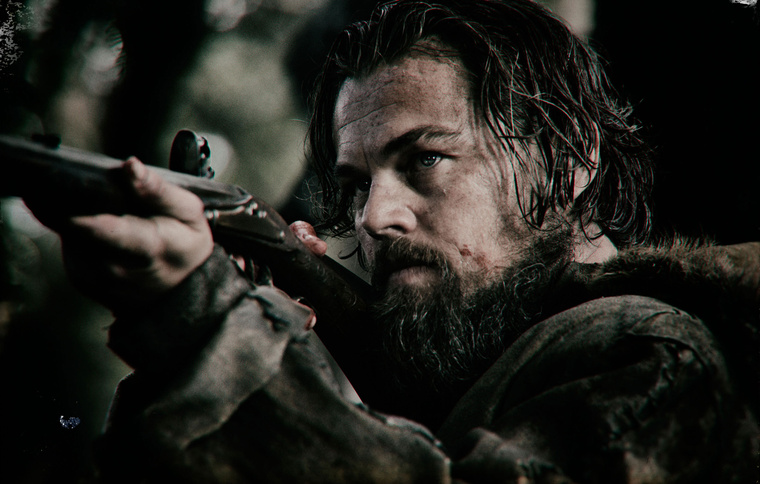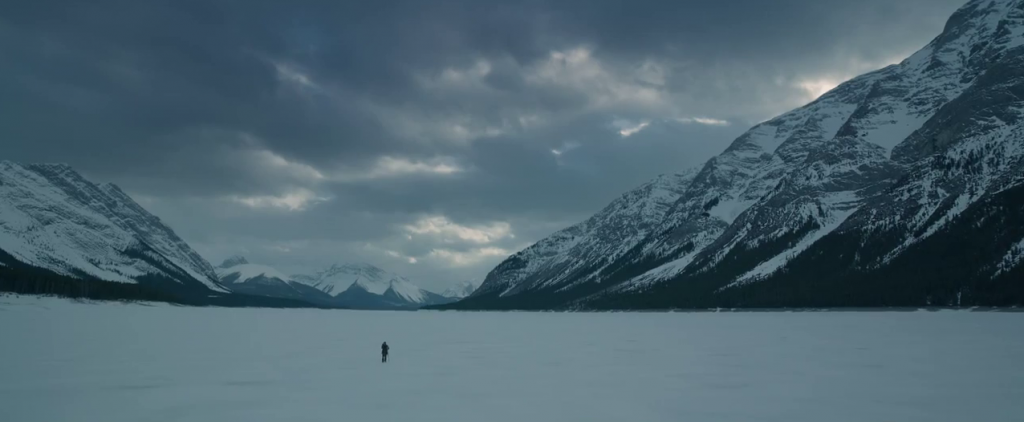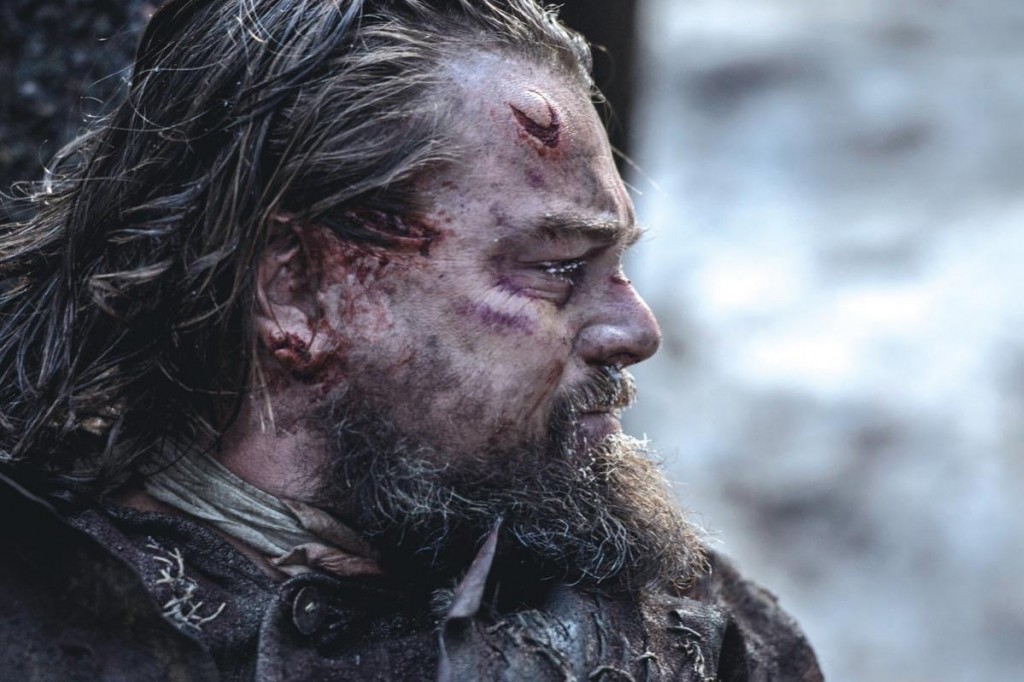The Revenant (2015)
 DIRECTOR: Alejandro Gonzalez Inarritu
DIRECTOR: Alejandro Gonzalez Inarritu
CAST: Leonardo DiCaprio, Tom Hardy, Domhnall Gleeson, Will Poulter
REVIEW:
WARNING: THIS REVIEW WILL REVEAL IMPORTANT ASPECTS OF THE FILM’S PLOT
For the follow-up to his 2014 Oscar-winning offbeat comedy-drama Birdman, Mexican director Alejandro Gonzalez Inarritu has chosen to take the saying “revenge is a dish best served cold” very, very literally. The Revenant is inspired by the true story of 1800s frontiersman Hugh Glass, which also inspired the 1971 Richard Harris film Man in the Wilderness, but takes its share of liberties with the true story, and the two loose versions of Glass’ tale are different enough to each be judged on their individual merits (The Revenant is not a remake of Man in the Wilderness, merely inspired by the same story, and does its own thing). In a year with its share of survival stories hitting theaters, it’s better-crafted than In the Heart of the Sea, and far more dark and brutal than The Martian (compared to The Revenant, The Martian is practically a comedy). In its “man vs. Nature” narrative, sometimes existential tone, and unflinching bleakness, it’s a cinematic cousin to both the Liam Neeson drama The Gray and the gritty Australian revisionist Western The Proposition. The Revenant is hardly the “feel good” movie of the year, and it definitely won’t be everyone’s cup of tea, but for those to whom the subject matter appeals, it’s a visceral, immersive, and uncompromising film experience.
We open in the early 1800s on the American frontier. A band of fur trappers is ambushed by a Native American war party which decimates their numbers and sends the survivors scrambling to their boat for relative safety. Having made their narrow escape (for the time being, at least), tension and infighting brews, centering around the group’s guide Hugh Glass (Leonardo DiCaprio), who is trusted by the honorable but inexperienced leader of the expedition, Captain Andrew Henry (Domhnall Gleeson), but not by the surly John Fitzgerald (Tom Hardy), who seethes over the loss of his valuable fur pelts and his distrust of Glass and his half-Indian son Hawk (Forrest Goodluck). While leading the group to safety, Glass scouts the woods alone and is ambushed and badly mauled by a grizzly bear, leaving him unable to move or speak and his life hanging by a thread. After attempting to care for Glass seems pointless and hauling him with them on the long trek back to civilization proves impractical, Captain Henry reluctantly presses on but offers hefty bonuses to three men to watch over him until he dies and give him a proper burial: Hawk, Fitzgerald, and the teenage greenhorn Jim Bridger (Will Poulter). Fitzgerald quickly decides to put Glass out of his misery, and when Hawk intervenes, a struggle ends with Hawk dead by Fitzgerald’s hand and Fitzgerald burying Glass alive and leaving him for dead, dragging a conflicted Bridger along. But Glass doesn’t die. The severely injured man digs himself out of his grave and embarks on a long quest to drag himself back to civilization and, eventually, seek vengeance against Fitzgerald. But before he gets a shot at revenge, he’ll have to face various more immediate problems, including his still half-crippling injuries, starvation, freezing cold and exposure, and the hostile Indians still on his trail.
The Revenant begins and ends with riveting action sequences, but in between the action comes in short brutal bursts, few and far between. We jump right in, plunged almost immediately into the opening Indian raid, and around twenty minutes into the movie, the pivotal bear mauling occurs, both brutal sequences in which the camera does not flinch away from what’s taking place onscreen, but apart from a couple narrow escapes from pursuing Indians, and the inevitable climactic mano-a-mano, this is not an action movie. Those going into The Revenant expecting a full-throttle revenge thriller may be disappointed. This is not a testosterone-fueled action flick, but a somber, serious drama that moves at a leisurely pace and demands a commitment of time and attention through its sizable two-and-a-half hour runtime. The tone is as dreary and dour as one is likely to find. There is no “comic relief”—the closest we come to a lighthearted moment is a peaceful interlude where Glass and a sympathetic Indian (Arthur Redcloud) catch snowflakes on their tongues—and the bleak tone is reminiscent of John Hillcoat’s dark, brutal Australian Western The Proposition (at one point, Hillcoat was attached to this project). This is also not a movie for the faint-hearted. The camera records unflinchingly as Glass cauterizes his neck wound with gunpowder, eats raw fish, bone marrow, and bison liver, and cuts open a dead horse and pulls out its internal organs to seek warmth inside its body (at times, it plays like Leonardo DiCaprio participating in a very intense episode of I’m a Celebrity, Get Me Out Of Here!). Dialogue is spare and terse, especially after Glass is left for dead. His throat wound reduces him to unintelligible wheezes and grunts for a good while, and apart from an encounter with the aforementioned helpful Indian, he doesn’t have anyone to talk to anyway (Tom Hardy gets more dialogue, but his thick hillbilly accent occasionally makes his lines difficult to understand, not for the first time). On several occasions, the filmmakers’ determination to immerse us goes so far as to break the fourth wall. DiCaprio’s breath fogs the camera lens, which at another point is splattered with snow and blood. Whether this distractingly reminds you that you’re only watching a movie, or adds to the sense of intimacy, depends on your individual perspective (it worked effectively enough, to me).
The Revenant has been described as a “revenge Western”, but while it has significant aspects of that—in fact, it’s the basic plot when whittled down to its essence—there’s more to it than that. Tom Hardy’s John Fitzgerald is the primary human antagonist, but at least until the last twenty minutes or so, the central conflict is not Glass vs. Fitzgerald, but man vs. Nature, in the form of a grizzly bear, hostile Indians, starvation, and freezing cold and exposure. The movie also paints morality in shades of gray. While many of the Indians on-hand are warlike and bloodthirsty, others come to Glass’ aid, and even the brutal warriors on the fur trappers’ trail prove to have a harsh sense of honor. And among the white men, the morally stalwart Captain Henry stands in contrast to the shifty Fitzgerald, who puts his own neck above all else. Even Glass himself is not so much a conventional heroic figure as a man driven by a relentless obsession with vengeance because it’s his only lingering reason to keep going. Likewise, it’s possible to somewhat understand, if not condone, Fitzgerald’s actions, which are motivated less by outright villainy and more by a combination of self-centered survival instincts and cynical pragmatism, and his killing of Glass’ son is not a premeditated calculated murder, but a panicky snap reaction. Glass is indisputably our protagonist, and Fitzgerald basically serves as the chief “villain” of the story, but there’s some gray area, and everything isn’t completely cut-and-dried, even with Inarritu and Mark L. Smith’s screenplay adding a fictional sacrificial son and a couple other cinematic embellishments to give Glass a more powerful motivation for vengeance and make Fitzgerald a little more villainous. It would have been easy to paint in broad strokes, but Inarritu steeps our simple premise in moral ambiguity.
 Much has been made of The Revenant‘s notoriously arduous shoot, which stretched out far beyond schedule, filming in both the previously mostly untouched wilds of Alberta, Canada and the mountains of the southernmost tip of Argentina, with Inarritu insisting on using only natural lighting (over a hundred members of the crew reportedly quit or were fired during filming, some of them accusing Inarritu of disregarding the cast and crew’s safety in pursuit of the perfect shot). There was no green screen or artificial sets simulating the actors’ immersion in a wild environment, although what little CGI is utilized is a little dodgy; the bear is convincing enough, but a herd of buffalo and a shot of Glass and horse plunging over a cliff are a little too obviously special effects. If the stories are to be believed, the production of The Revenant
Much has been made of The Revenant‘s notoriously arduous shoot, which stretched out far beyond schedule, filming in both the previously mostly untouched wilds of Alberta, Canada and the mountains of the southernmost tip of Argentina, with Inarritu insisting on using only natural lighting (over a hundred members of the crew reportedly quit or were fired during filming, some of them accusing Inarritu of disregarding the cast and crew’s safety in pursuit of the perfect shot). There was no green screen or artificial sets simulating the actors’ immersion in a wild environment, although what little CGI is utilized is a little dodgy; the bear is convincing enough, but a herd of buffalo and a shot of Glass and horse plunging over a cliff are a little too obviously special effects. If the stories are to be believed, the production of The Revenant was nearly as much an endurance contest as what Glass experiences onscreen. Inarritu and cinematographer Emmanuel Lubezki (who won back-to-back Oscars for his work on Gravity and Birdman, the latter his first collaboration with Inarritu), capture lots of pretty pictures and succeed in making the untamed wilds look both beautiful and foreboding. In fact, there are times, especially in the sluggish sizable middle portion, when their infatuation with their surroundings could have been reined in a little. All those long, lingering shots of dawns and stars and misty forests and snow-capped mountain peaks are certainly picturesque, but after two-and-a-half hours’ worth, they start to all look the same.
It’s hard to deny that The Revenant runs a bit too long. Some superfluous scenes could have been trimmed for a tighter runtime and a less meandering pace, and in the hefty midsection, all those scenes of Glass crawling through the woods gets a bit repetitive. The flashbacks and dreamlike visions Glass experiences periodically over the course of the film are also both sometimes confusing and superfluous. There’s also underlying existential questions of spirituality; Tom Hardy delivers a rambling monologue involving a God allegory, while DiCaprio gets a dream sequence involving a ruined church (incongruously Eastern European Orthodox) and a visit with his deceased son. Inarritu’s self-indulgence and pretentiousness shines through the most flagrantly in these scenes; for what is, at its core, such a simple and straightforward survival/revenge story, Inarritu’s attempts to inflate it to quasi-mystical levels don’t really work, and only muddle the main storyline. A subplot involving the Indian war party and a band of French fur trappers who pop up at intervals throughout the movie is also tacked on seemingly for the sole purpose of serving as a convenient deus ex machina in the climax. Considering we’re asked to spend a formidable commitment of time and attention following his trials and tribulations, Glass is a thinly-drawn central protagonist; what little we learn of his backstory is sketched out in fleeting flashbacks, and our rooting for him comes more from the fact that he’s been terribly wronged and is played by a popular movie star whom many viewers instinctively sympathize with than him really being a three-dimensional individual.
But when The Revenant shifts into high gear, it kicks like a mule. The opening swift and brutal Indian raid is a thrilling opening number (sort of the frontier Western equivalent to the beach landing in Saving Private Ryan), and the unsparing mauling (in which the bear throws Glass around like a rag doll, rips his back open, slashes his throat, and then comes back for more) reportedly drove some test screening viewers with weaker constitutions to flee the theater. The climactic hand-to-hand fight is equally bloody and brutal. While the two movies’ plots have little in common, in its spurts of savage violence breaking into an otherwise meditative tone, the closest cinematic cousin that came to mind for The Revenant, as far as overall tone, is the gritty, bleak, and brutal Australian “revisionist Western” The Proposition. Both paint in shades of gray, and both are grim to the point of leaving the viewer with a bit of an empty feeling when all the unrelenting brutality is over. The Revenant does not glorify revenge. It’s about raging against the dying of the light, but it may also ultimately be about accepting when it’s time to let go, and the ways in which vengeance, while it can be a powerful motivator, can also leave one an empty shell once it’s been achieved. The odyssey reaches a climax, but viewers will find no conventional “happy” ending.
 With The Revenant, Leonardo DiCaprio continues to demonstrate that he has left the lightweight pretty boy of Titanic far behind and seeks out challenging roles to show himself as a serious and dedicated actor. Buried under long unwashed hair and a scraggly beard, there is nothing glamorous or sexy about DiCaprio here, and his spoken lines are few and far between (and even then a significant portion of them are in a subtitled Native American language). This is not a one-man show (Tom Hardy, Will Poulter, and Domhnall Gleeson all have decent amounts of screentime), but large chunks of the movie fall squarely on DiCaprio’s shoulders, the camera following the thoroughly deglamorized actor in unsparing close-up as he uses agonized expressions and body language more than his spare dialogue. From a purely acting standpoint, this is not the most complex or impressive role DiCaprio has ever played, but it is without a doubt his most raw and grueling. It remains to be seen whether this will earn him his long-coveted but elusive Oscar victory, and it’s debatable whether it’s an Oscar-worthy performance, but what should not be in dispute is DiCaprio’s commitment to his craft.
With The Revenant, Leonardo DiCaprio continues to demonstrate that he has left the lightweight pretty boy of Titanic far behind and seeks out challenging roles to show himself as a serious and dedicated actor. Buried under long unwashed hair and a scraggly beard, there is nothing glamorous or sexy about DiCaprio here, and his spoken lines are few and far between (and even then a significant portion of them are in a subtitled Native American language). This is not a one-man show (Tom Hardy, Will Poulter, and Domhnall Gleeson all have decent amounts of screentime), but large chunks of the movie fall squarely on DiCaprio’s shoulders, the camera following the thoroughly deglamorized actor in unsparing close-up as he uses agonized expressions and body language more than his spare dialogue. From a purely acting standpoint, this is not the most complex or impressive role DiCaprio has ever played, but it is without a doubt his most raw and grueling. It remains to be seen whether this will earn him his long-coveted but elusive Oscar victory, and it’s debatable whether it’s an Oscar-worthy performance, but what should not be in dispute is DiCaprio’s commitment to his craft.
This is DiCaprio’s show first and foremost, but the small supporting cast is fine in their more limited material. Tom Hardy, finishing off a busy year and showing, as in this summer’s Mad Max: Fury Road, that like DiCaprio he is willing to subject himself to arduous film shoots, does a 180 from his most recent dual role as the clean-cut, debonair Kray gangster twins into an unkempt bearded mountain man. While he’s basically playing the main “villain”, Hardy foregoes mustache-twirling and plays Fitzgerald as a man whose moral character could charitably be called questionable but whose worst misdeeds are driven by fear more than malice. Fitzgerald is not a consistently straightforward “bad guy”, but like a cornered animal, the more threatened he feels, the worse the actions he’s willing to resort to. Also expanding his range is the up-and-coming Domhnall Gleeson, whose Captain Henry is nothing like either the lovelorn dork in About Time or the Nazi-like General Hux in the also currently playing Star Wars Episode VII: The Force Awakens. Will Poulter capably completes the primary acting quartet as the teenage greenhorn Jim Bridger, who is beset by a guilty conscience after leaving Glass behind (particularly when he realizes he’s been misled by his traveling companion). Small roles include Paul Anderson and Lukas Haas, but the scraggly beards sported by almost the entire cast can make faces hard to pick out.
The Revenant is an easier movie to admire than “like”. It’s grim and unrelenting, and the conclusion offers a victory of sorts (albeit a somewhat hollow one) but no real catharsis. For those seeking a “happier” survival story, The Martian is a far more conventionally entertaining and uplifting viewing experience. But there’s room for all sorts of movies, and while The Revenant will definitely not be everyone’s cup of tea, it’s an exhausting, visually arresting, sometimes harrowing, and haunting visceral and immersive experience for those willing to answer its not inconsiderable demands of commitment and attention.
* * *